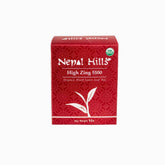Organic tea farming in Nepal
Nestled in the foothills of the Himalayas, Nepal's tea industry is undergoing a significant transformation. As global demand for organic products rises, Nepali tea farmers are increasingly embracing organic farming methods. This shift not only aligns with traditional practices but also positions Nepal's tea industry for a sustainable future.

The Transition to Organic Farming
Embracing Tradition
For many Nepali tea farmers, the transition to organic farming is less a radical change and more a return to roots. Traditional farming methods in Nepal have long emphasized natural approaches:
- Use of cow manure as fertilizer
- Natural pest control methods like neem-based solutions
- Reliance on rainfall rather than artificial irrigation
These practices, passed down through generations, form the foundation of organic tea farming in Nepal.
Driving Factors
Several factors have accelerated the transition to organic farming:
- Growing global demand for organic products
- Premium prices for certified organic tea
- Environmental concerns and soil health
- Government initiatives promoting sustainable agriculture
One farmer, Hari Sharma, shares his experience: "We've always farmed naturally, but now we see the value in getting certified. It's good for the land and good for our income."
The Certification Conundrum
Despite the increasing adoption of organic practices, only 15-20% of Nepali tea farms have achieved Organic Certification. This discrepancy highlights the challenges faced by small-scale farmers in the certification process.
Barriers to Certification
- Cost: The certification process can be expensive for small farmers.
- Paperwork: Extensive documentation requirements can be daunting.
- Time: The transition period (typically 3 years) can strain farmers' resources.
- Limited awareness: Some farmers lack information about certification processes and benefits.
Bridging the Gap
Efforts are underway to increase the number of certified organic farms:
- Government subsidies for certification costs, but a proper program has not been developed yet.
- NGO-led training programs on organic practices and certification
- Cooperative initiatives to share certification costs among farmer groups, which has helped to bring more farmers under the certification wing
The Changing Landscape
The organic tea sector in Nepal is evolving rapidly, driven by both opportunities and challenges.
Incentives for Organic Production
- Price premiums: Organic-certified tea often commands higher prices in international markets.
- Market access: Growing demand in health-conscious markets like Europe and North America.
- Environmental sustainability: Organic practices help preserve Nepal's fragile mountain ecosystems.
- Health benefits: Reduced exposure to harmful chemicals for farmers and consumers.
Challenges in Achieving Organic Certification
- Limited resources: Many small-scale farmers struggle to invest in the certification process.
- Knowledge gap: Lack of awareness about certification requirements and processes.
- Infrastructure: Inadequate processing facilities for organic tea in some regions.
- Market volatility: Fluctuating demand and prices can make long-term planning difficult.
Looking Ahead
As Nepal's tea industry continues to evolve, several trends are emerging:
- Cooperative models: Farmers are forming groups to share certification costs and knowledge.
- Government support: Increased focus on promoting organic agriculture through policy initiatives.
- Value-added products: Development of specialized organic tea blends and products.
- Agro-tourism: Growing interest in tea tourism centered around organic farms.
- Private Support : Companies like Nepal Hills Tea are donating their revenue to support organic tea farming in Nepal.
Conclusion
The journey towards widespread organic tea farming in Nepal is ongoing. While challenges remain, the shift towards organic practices aligns well with Nepal's traditional farming methods and positions the country's tea industry for a sustainable future.
As more farmers recognize the benefits of organic certification and overcome the hurdles, Nepal's organic tea sector is poised for growth, offering unique, high-quality teas to discerning consumers worldwide.





